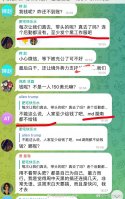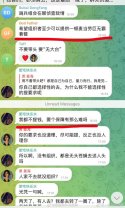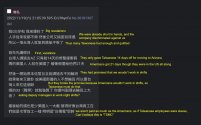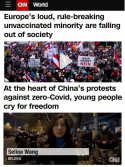You are using an out of date browser. It may not display this or other websites correctly.
You should upgrade or use an alternative browser.
You should upgrade or use an alternative browser.
Miscellaneous News
- Thread starter bd popeye
- Start date
Those middlemen are terrible. The hire-a-crowd gangs have given up trying to fight for that 80RMB they are owned and are now fighting over other aspects of remuneration:LOL...
"Lessons learned Next time, let's hope the middleman do not siphon off the money we pay for the protesters And also, make sure the protesters learn the local dialects properly"
View attachment 102825

"Where are the leaders, where are the logistic support? Can we at least get some black uniforms?"

"I'm not asking for money, but can we at least get a Big Mac for lunch?"

"Forget about Mcdonald's, I prefer KFC crazy Thursday".
Now there's some Freedom Fighter material, either that or some kind of KFC astroturf marketing campaign. What's the deal for crazy Thursday? Nine pieces for 9 yuan or something?
For moments like this I'll have to quote Chairman Mao again:
革命不是请客吃饭
"Revolution is not a dinner party"
Last edited:
CIA has gone cheapskate....Those middlemen are terrible. The hire-a-crowd gangs have given up trying to fight for that 80RMB they are owned and are now fighting over other aspects of remuneration:
View attachment 102829
"Where are the leaders, where are the logistic support? Can we at least get some black uniforms?"
View attachment 102828
"I'm not asking for money, but can we at least get a Big Mac for lunch?"
View attachment 102827
"Forget about Mcdonald's, I prefer KFC crazy Thursday".
Now there's some Freedom Fighter material, either that or some kind of KFC astroturf marketing campaign. What's the deal for crazy Thursday? Nine pieces for 9 yuan or something?
bajingan
Senior Member
All their $$$ gone to ukraine it seems, putin really did China solid lolCIA has gone cheapskate....
Seeing the discussion above regarding China is now moving from minimal deterrence to MAD regarding her nuclear arsenal policy - I found this interesting community post from a Youtube channel called CaptainCool07 which I would like to share here.
CaptainCool07 was once a pro-Taiwan independence anti-SeeSeePee boba liberal, but sometime in 2016 he did a 180, and now he's a avid China and CPC-supporter.
~~~Quoting the post, with some modification~~~
To summarize:
1. China always seeks to limit and reduce the scale and period of conflict whenever situation permits;
2. China always seeks to refrain from escalating conflict whenever possible;
3. China always leaves a backdoor for the opposing side to retreat to whenever possible (in Chinese, we call this 给对方留台阶, i.e. leaving a backstage stair for the opposing side);
4. China always calls for settlement of the conflict that woud leave every participant in the conflict at least some face and some gains whenever situation permits;
5. However, in case China is forced into a dead end corner whereby her security, safety, integrity, and its very own survival is under dire threat, China would never hold back, and with absolute certainty fight tooth-and-nail with everything they have; and
6. When that happens, China can and will put up a very solid fight. In that case, the enemy would never leave the conflict bruise-less and injury-less.
CaptainCool07 was once a pro-Taiwan independence anti-SeeSeePee boba liberal, but sometime in 2016 he did a 180, and now he's a avid China and CPC-supporter.
~~~Quoting the post, with some modification~~~
What do Russian analysts think of China's military and Use of war? Let's read an article by Russian (geopolitical analyst/historian?) Alexander Timokin:
"Eurocentrism, which, alas, our (Russian) society is still obsessed with, makes it difficult to see history clearly. One such example is the approach of our neighbor, China, to the use of military force. In Russia, we often think that “the Chinese do not know how to fight."
"In fact, the Chinese approaches to the use of military force are totally different compared to what the rest of humanity practices. This is a reflection of how (this is a very important remark) the Chinese themselves are."
"As you know, the Chinese pushed the UN troops back to the 38th parallel (during the Korean War). To appreciate the significance of this fact, one must understand that they were opposed by troops with the most advanced military equipment for that time, trained and equipped according to the United States model, having powerful artillery, fully mechanized and having air supremacy, which at that time there was simply no one to challenge."
"The Chinese themselves were mainly foot troops with a minimum of horse-drawn vehicles, armed mainly only with small arms, with a minimum of mortars and outdated light artillery. Transport was critically lacking, even horse-drawn, radio communication between the company-battalion link was completely absent in the battalion-regiment link - almost completely. Instead of radio and field telephones, the Chinese used foot messengers, horns and gongs."
"It is difficult for a modern person to appreciate this. The Chinese pushed back the US and its allies with all their might literally with their bare hands... Those who say that the Chinese do not know how to fight should (really) rethink (about) this."
"In 1969-1970, China attacked the USSR. Unfortunately, our national narrative has hidden the real content of the conflict. But it was the Batte for Damansky which most clearly demonstrated the Chinese approach to war... In this battle, The USSR defeated the Chinese troops on the battlefield, but lost politically. Interesting, right?"
Let's list what China received as a result of the conflict:
1. China has shown that it is no longer a junior partner of the USSR, even nominally. At that time, the consequences of this were still not clear to anyone, but the future American strategy to pump China with money and technology in order to create a counterbalance to the USSR was born out of the results of the Soviet-Chinese clashes at Damansky.
2. China has shown that it is not afraid of war with nuclear powers. This seriously raised its political weight in the world, in fact, the formation of China as an independent military-political "center of power" in the world began precisely then.
3. China received a high-tech captured weapon for study and copying - the T-62 tank. Especially important for the Chinese was familiarity with the smoothbore tank gun and all that it gives.
4. China subsequently took over the disputed island de facto. After the collapse of the USSR, this territory became de jure Chinese.
Now let's see what the USSR got:
1. We proved that we can defeat the Chinese on the battlefield, but that was all we got.
2. The USSR now faced two fronts. One in Europe and one in China. The question of what it cost the Soviet economy and how it influenced the collapse of the USSR has not yet been sufficiently studied but was likely. Moreover, the behavior of the Soviet military-political leadership in subsequent years bore certain signs of panic.
In all seriousness, it was discussed how to stop the Chinese hordes when they go across the border. New lines were created, including with the use of nuclear weapons, new divisions were deployed. The Chinese threat even influenced the weapons systems being created, for example, the 30-mm six-barreled gun on the MiG-27 appeared precisely as a response to the Chinese tank threat.
All this ended up costing a lot of resources.
3. The disputed territory was eventually lost.
--------Let's draw some conclusions:
The Chinese use military force to “educate” governments they don’t like with small attacks and leaves once it achieved a desired line of behavior. An example, again, is Vietnam - The Chinese won all of the main battles and left. Let's see what China got from this war:
1. A powerful slap in the face was given to the USSR, which did not intervene.
2. All the expansionist plans of the Vietnamese, who tried on the role of a regional power, were buried. Convinced of the reality of the Chinese threat, Vietnam in the 80s began to curtail its foreign operations, and by the beginning of the 90s they had completed them.
3. China has again confirmed to the whole world that it is an independent player who is not afraid of absolutely anyone.
4. Deng Xiaoping significantly strengthened his power, which made it easier for him to start reforms.
5. The Chinese military-political leadership became convinced of the need for an early military reform.
Vietnam and USSR as a result of this war received nothing except propaganda that "the Chinese (has been defeated and is forced to) retreat."
"Chinese approach to war is very different from the American approach, when unsympathetic countries fall under the pressure of sanctions and constant military pressure forever, and if it comes to war, then the enemy is completely destroyed. We have seen an example of this sadistic approach in the form of American missile attacks on Syria. The West always seeks the complete destruction of the opponent."
"And also very different from the Western approach is that the Chinese always leave the enemy the opportunity to get out of the conflict without losing face. None of China's adversaries has ever faced a choice between a complete loss of national pride and an end to the war on non-reasonable terms. It must be admitted that the Chinese way of waging war is much more humane than the Western one."
"First, China seeks limited-scale and time-limited military action."
"Second, China retreat from the risk of escalation ."
"Thirdly, China always tries to leave the enemy a way out of the situation, when China's security is at stake, and when none of this works, and the Chinese are fighting desperately with large forces, and they can fight VERY WELL."
To summarize:
1. China always seeks to limit and reduce the scale and period of conflict whenever situation permits;
2. China always seeks to refrain from escalating conflict whenever possible;
3. China always leaves a backdoor for the opposing side to retreat to whenever possible (in Chinese, we call this 给对方留台阶, i.e. leaving a backstage stair for the opposing side);
4. China always calls for settlement of the conflict that woud leave every participant in the conflict at least some face and some gains whenever situation permits;
5. However, in case China is forced into a dead end corner whereby her security, safety, integrity, and its very own survival is under dire threat, China would never hold back, and with absolute certainty fight tooth-and-nail with everything they have; and
6. When that happens, China can and will put up a very solid fight. In that case, the enemy would never leave the conflict bruise-less and injury-less.
Last edited:
He said protestors who break the law should feel the full force of it. The broken law here is holding protests illegally. Wasn’t this guy lecturing China a few days ago about the right to protest?




